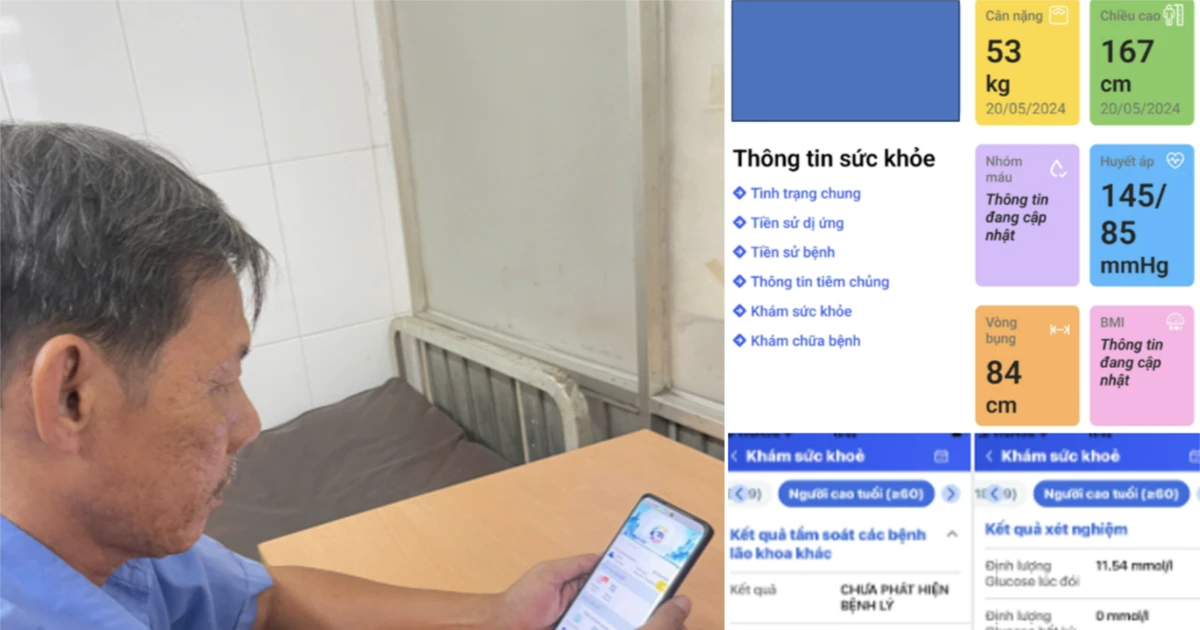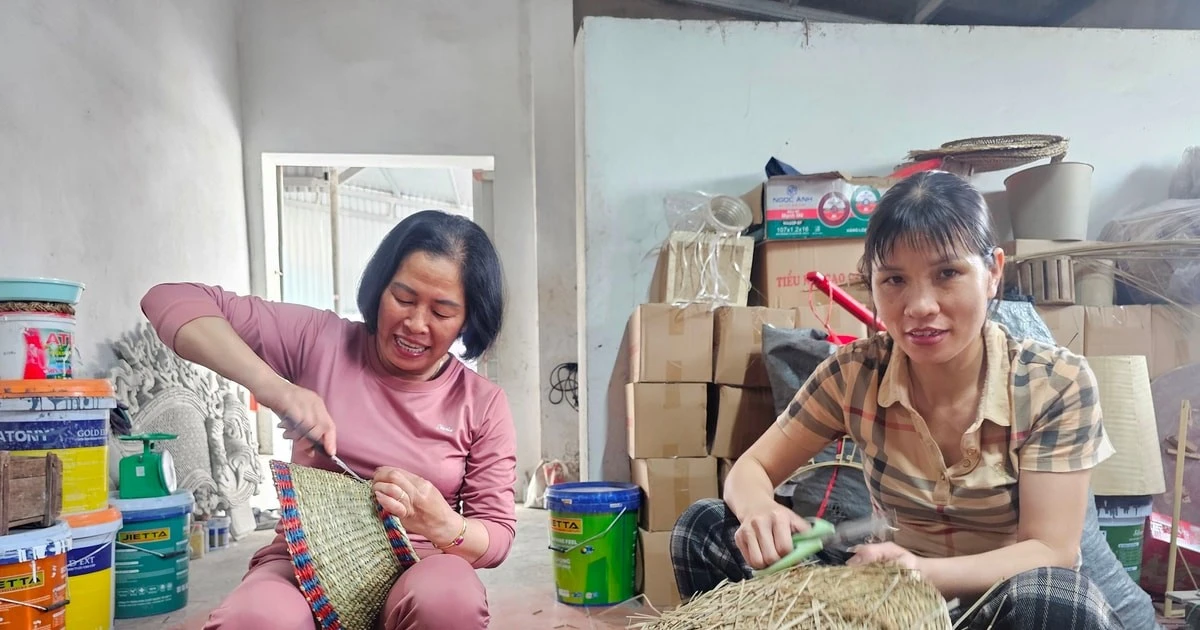Drink enough water, steam your nose and throat, drink ginger and honey tea,... to help improve persistent cough symptoms after Covid-19.
Persistent cough can last for weeks or months after Covid-19 infection. Master, Doctor Dang Thanh Do, Department of Respiratory, Tam Anh General Hospital, Hanoi, said that after entering the body, the virus affects the vagus nerve or damages the larynx and throat mucosa, causing cough. Covid-19 patients with complications of bronchitis, pneumonia, pulmonary fibrosis after recovering from the disease may still have a prolonged cough. During the recovery phase, the body creates a cough reflex to remove secretions and phlegm remaining in the airways. People with chronic lung disease or gastroesophageal reflux who have to take many medications are also at risk of persistent cough after Covid-19.
People with nasal discharge running down the back of the throat, causing irritation of the throat, may have a persistent cough. In addition, persistent cough symptoms can originate from causes such as viral infections, other respiratory bacteria (influenza virus, pneumococcus, Adenovirus, ...), weather allergies, cigarette smoke or chemicals.
If coughing is frequent and prolonged, causing fatigue, insomnia, and affecting quality of life, the patient needs to see a doctor to determine the exact cause. In cases where the cough is not caused by a medical condition, the patient needs to develop a reasonable diet and exercise regimen, and the cough will gradually improve. Doctor Thanh Do suggests simple methods to reduce post-Covid-19 cough.
Drink enough water
Drinking enough water, especially warm water, helps warm the throat, increase blood circulation, reduce irritation, reduce dry throat, thin phlegm, thereby reducing cough. Adults should drink about 2 liters of water per day. Some drinks that help reduce cough are herbal tea (ginger tea, honey lemongrass, chamomile tea), warm fruit juice,...

Drinking enough water helps reduce dry throat, thin phlegm, thereby effectively reducing cough. Photo: Freepik
Salt water mouthwash
Gargling with salt water helps kill bacteria, loosen mucus, reduce sore throat, and thus reduce coughing time. You can use half a teaspoon of salt mixed with 240ml of warm water to gargle or use 0.9% saline solution available at pharmacies.
Practice active breathing
Practice deep breathing exercises such as pursed lip breathing and diaphragmatic breathing about 2-3 times/day, 15 minutes each time, to help increase gas exchange and improve lung function.
Pursed lip breathing : Lie or sit comfortably, relax your neck and shoulders, and relax your whole body; inhale slowly through your nose; exhale slowly with your lips pursed as if you were whistling, exhaling for twice as long as inhaling.
Diaphragmatic breathing : Lie on your back or sit up straight, relax your neck and shoulders, and relax your whole body; place one hand on your belly and the other on your chest; inhale slowly, evenly, and deeply through your nose, feeling your belly expand; your chest does not move; gradually draw your belly in as you exhale slowly through your mouth.
Sleep with your head elevated.
In a lying position, gravity causes mucus to collect in the throat instead of flowing out. Therefore, coughing often occurs more at night to expel the mucus. You should elevate your head when sleeping to overcome this problem. In addition, sleeping this way also helps reduce gastric reflux - one of the causes of frequent coughing at night.
Stay away from cigarette smoke
Dr. Thanh Do said that people with Covid-19 who are exposed to a lot of cigarette smoke can increase their cough because cigarette smoke reduces the elasticity of the alveoli, narrows the lung capacity, changes the structure of the bronchial mucosa, causing the bronchial wall to thicken, the bronchial lumen to narrow, and obstructs air circulation. Nicotine paralyzes the cilia, mucus and toxins accumulate in the lungs, causing lung congestion. Not enough oxygen is supplied to the body, making it difficult for the patient to breathe, causing persistent cough, increasing the risk of respiratory diseases. Quitting smoking and staying away from cigarette smoke helps improve the condition of prolonged cough after Covid-19 infection.
Vitamin D supplement
Sunlight is the source of vitamin D synthesis for the body. However, to get enough vitamin D, the skin must be exposed to sunlight when the UV content is high. Therefore, to be safe, you should consult your doctor to use functional foods that supplement vitamin D with the appropriate dose. In addition to vitamin D, you need to supplement vitamin C and zinc to increase resistance. Eat a balanced diet, increase the intake of green vegetables, fruits and use more yogurt to improve the immune system. You should not eat or drink cold foods because they can irritate the throat, causing a persistent cough.
Steam inhalation
Warm steam moisturizes dry and irritated respiratory tracts, thins mucus, thereby reducing the frequency of coughing. You can use an essential oil diffuser or steam your nose and throat with cajeput, cinnamon, lemongrass, and mint essential oils mixed with hot water to steam your nose and throat about 2-3 times a day. Be careful not to put your face too close to the water to avoid burns. You can use a towel to cover your head to increase the effectiveness. In addition, you should take a warm shower instead of cold water to reduce coughing.
Trinh Mai
Source link


![[Photo] General Secretary To Lam receives Philippine Ambassador Meynardo Los Banos Montealegre](https://vstatic.vietnam.vn/vietnam/resource/IMAGE/2025/4/24/6b6762efa7ce44f0b61126a695adf05d)
![[Photo] President Luong Cuong meets with Lao National Assembly Chairman Xaysomphone Phomvihane](https://vstatic.vietnam.vn/vietnam/resource/IMAGE/2025/4/25/dd9d8c5c3a1640adbc4022e2652c3401)


![[Photo] Liberation of Truong Sa archipelago - A strategic feat in liberating the South and unifying the country](https://vstatic.vietnam.vn/vietnam/resource/IMAGE/2025/4/25/d5d3f0607a6a4156807161f0f7f92362)
![[Photo] President Luong Cuong holds talks with Lao General Secretary and President Thongloun Sisoulith](https://vstatic.vietnam.vn/vietnam/resource/IMAGE/2025/4/24/98d46f3dbee14bb6bd15dbe2ad5a7338)

























































































Comment (0)